#armorica story
Text


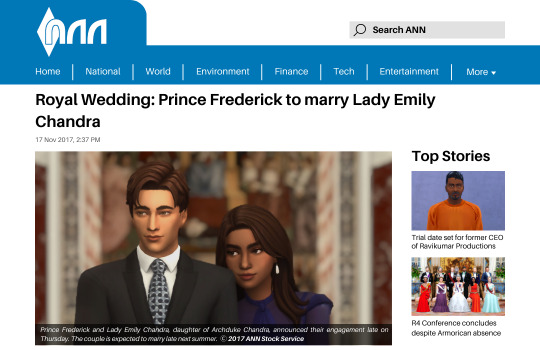

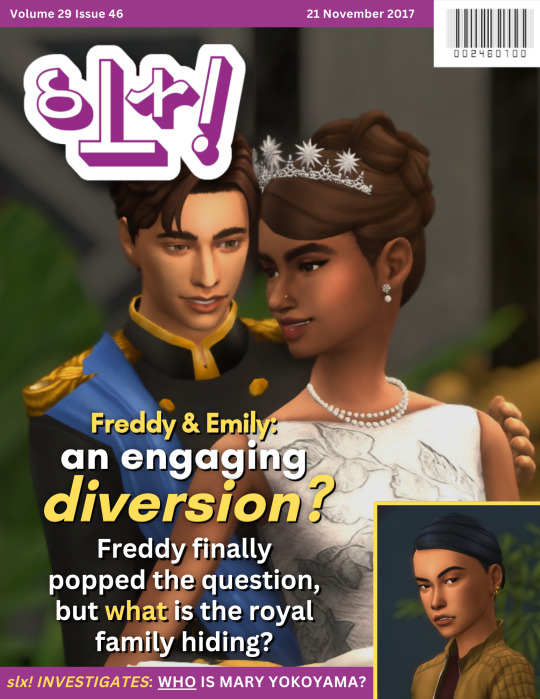
Previous | Chapter Start | Beginning | Epilogue
author's note: thank you to @crownsofesha, @housekonig, @bridgeportbritt, and @simming-in-the-rain for sharing screenshots and headlines with me to fill out the news!
ETA: Thanks to @sirianasims for catching my typo!
#armorica story#chapter 3#slx!#the star#breizh daily shield#simmagazine#character: frederick st. fleur#character: emily chandra#character: mary yokoyama#character: rosalind st. fleur#character: andre st. fleur#character: beatriz reyes#character: arnaut reyes#character: german reyes#armorica collabs#crownsofesha#housekonig#bridgeportbritt#simming in the rain
71 notes
·
View notes
Text
Random Line WIP Tag
*~.~~.*.~~.~*
got tagged by @armoricaroyalty & @sirianasims :3 thank u sm.
from posts I have in my Q:
"Cut."
"No-no wait! Just let her get into it!"
from a future event that hopefully will happen by the end of the year:
"I did what I thought was best. For all of us. And I was right."
and from something so far into the future that it's open to change lol watch this spot:
"Why didn't you tell me??"
"You would have left."
"Well DUH."
i did a lil extra lul don't mind me. I tag @daniigh0ul @lynzishell @colourfullsims and @nilonne (if u already done it i tag you again tag ur it)
#tag game#random line wip tag#technically armorica tagged my main but there currently be no stories there#kinda a wasteland which is a fun ~twist~ on the norm#usually over here is *crickets*
6 notes
·
View notes
Note
What are some of the other countries in the alt-history your Inver stories are set in? Is Armorica roughly where modern day Brittany would be? :0
Because our concept of countries is very modern & constructed it's not quite that Armorica or Hibernia were Countries as we might understand them. They were mostly made up of smaller fractured kingdoms and cultures which were always fighting one another. Armorica was a region which was roughly here (map and history ramble under the cut SORRY i basically didn't answer your question i got carried away)

(this map is from the 1860s! not Finbarr's time.. I still need to make a map of that)
but it was never a country, just a region alternatively ascribed to Inver or Aquitan. It fell on the northern side of the Inver border with Aquitan whenever it was established but the border was put there rather arbitrarily and cut across the region without consideration for the people who lived there.
So there IS in fact a whole other history which doesn't even concern Inver at all. There is a small city-state on the southern coast of Aquitan called Suzette, which was founded by the pseudo-Catholics of this world and used as their main base of operations. It's basically just the Vatican, but an early actually-Catholic historical figure called (Saint) Alexandre led a schism with the church and was successful. The schism dealt with the legality of using magic to advance the church's position, Alexandre argued that it was a moral imperative to preserve the ability to use magic within the ranks of their holy knights. Alexandre became a very polarising figure but his most famous follower was military leader called Renzo who, in the renaissance period, basically upturned and reshaped the entirety of the Mediterranean region.
At the time, Aquitan was a kingdom with an absolute monarchy and the same werewolf-based religion as the nobility of Inver (the winners of Finbarr's war were the Aquitanian werewolves and it became the dominant religion in Inver as well). Renzo led a religious crusade against the monarchy of Aquitan, to wipe out all that pagan werewolf stuff. He blindsided the queen of Aquitan, who had been running her own campaign of expansion against the king of Notte [placeholder name], on the far-western coastline of Iberia. When Renzo began winning substantial victories in the southern countryside of Aquitan, the queen immediately turned around and ""allied"" with the king of Notte, by mounting an invasion against the city of Notte and forcing him to surrender and play nice. She sent him off on an enforced holiday under house arrest, aware that her play relied on not martyring this king while she ruled his country in all but name. With the combined might of these two kingdoms she was certain she could crush Renzo, and this began a decades-long war.
Unfortunately for everyone involved, the king of Notte was killed by bandits who didn't even know who he was, before he ever reached his holiday home. The nondescript carriage was ambushed and there were no survivors. The queen, in a panic, chose not to publicise his death.
Well guess what Renzo was doing with his holy knights' blood magic. With each victory his army grew, because he raised the dead to serve him. Resurrection and immortality were key themes of Saint Alexandre's teachings and although Renzo's war crimes would result in his own religion banning the practice of this type of magic, it was kind of a-ok back then (the Church of Suzette would later go on to be pioneers of medical innovations such as antibiotics, germ theory, and safe anaesthesia). And you'll never guess whose dead body Renzo's knights found one day, dumped on the side of the road. Renzo alone recognised what had just come into his possession, and he formulated a counter-play against the queen by using the dead king as his own pawn. Using the king, he got the entire Iberian peninsula to turn on the Aquitanian monarchy, so instead of it being 2-on-1 against Renzo, it was suddenly the queen who was dangerously outnumbered and deeply unpopular.
The monarchy of Aquitan was finally defeated by its own people sixty years after the war began, and a theocracy based on the teachings of Saint Alexandre was founded there, along with the city-state of Suzette. The final execution of the monarchists had severe ripple-effects that reached Inver, which had been pretty insulated from the war by virtue of being a kinda pointless place to invade and housing a population of faeries outnumbering humans 10 to 1. The monarchy of Inver took pride in its links to the Aquitanian nobility and now that was gone. The result was a death spiral for the Kingdom of Inver, as the werewolf monarchists, fearing their imminent extinction, began to fight one another to grab as much power and wealth as possible before the Suzettes reached them, too. They banned the church at the border, only allowing the harmless priests of Suzette's poor Austerity sect to build their hospitals, though they were forbidden from holding religious services and actively converting the public, you have to willingly join.
The final Hibernian families who bought into the monarchy of Inver included the descendants of Finbarr, who had largely betrayed everything he would have stood for by assimilating into their enemies' ranks. And, as anyone might have predicted, their assimilation did not protect them when the nobles of Inver chose to prune their own ranks to concentrate power. One of these families was the noble and now extinct Mercier family, the family of one of our protagonists of Said the Black Horse (bowman lol). The other two protagonists are a second-gen immigrant Hibernian and a war orphan originally from Notte.
#setting: inver#oh god. hey. do you want to learn some fantasy history#it's not even spoilers. it's just bg info#there's more... so much more....
118 notes
·
View notes
Text
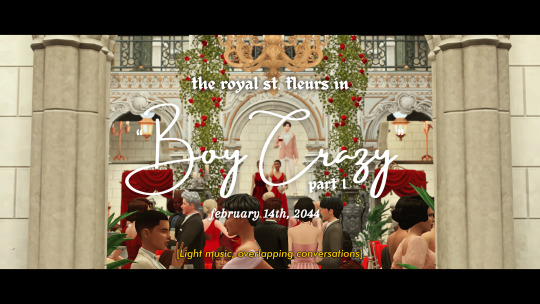
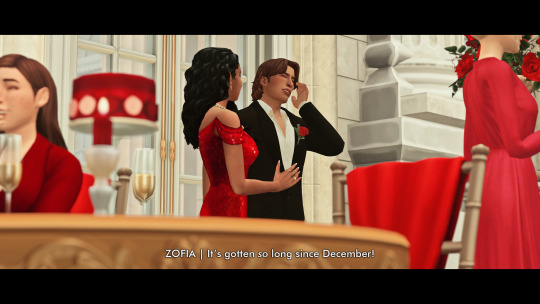



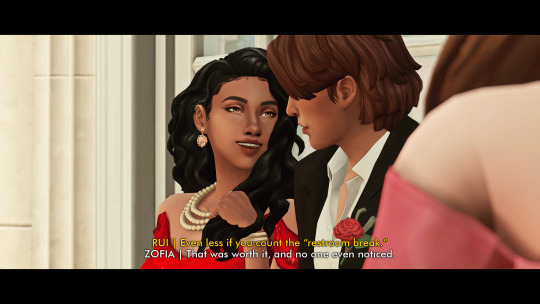

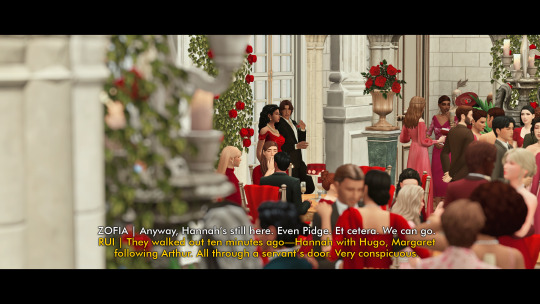
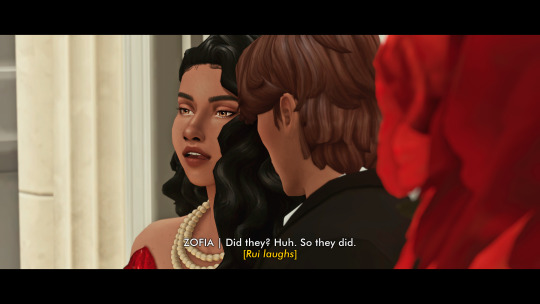



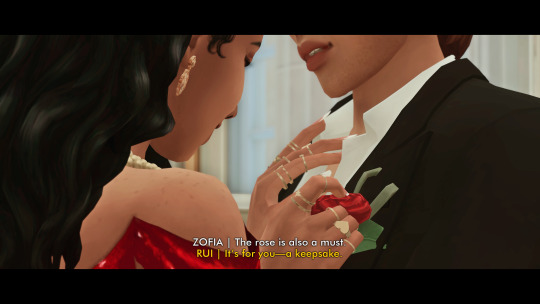
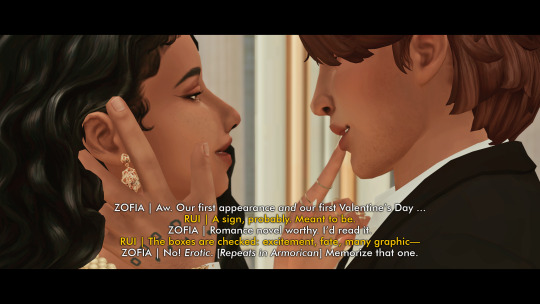
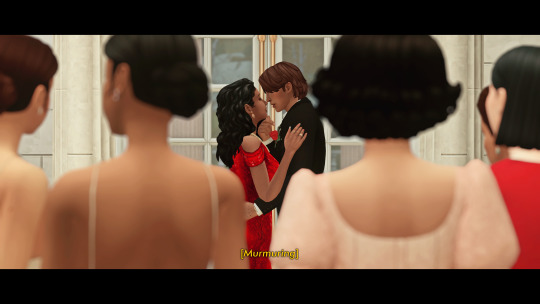

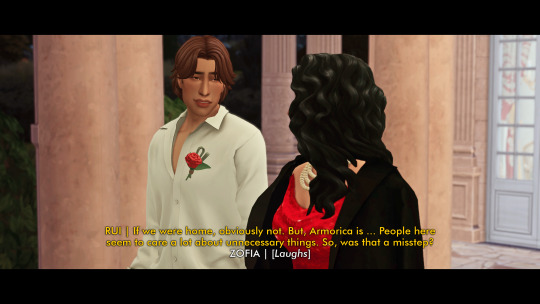


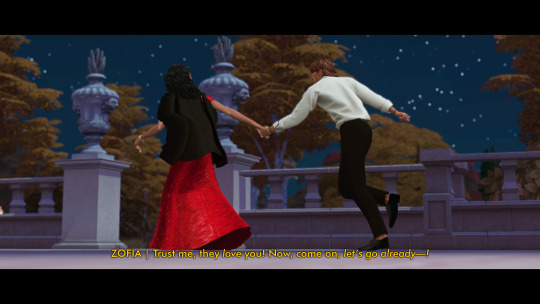
𝐕𝐀𝐋𝐄𝐍𝐓𝐈𝐍𝐄'𝐒 𝐃𝐀𝐘 𝟐𝟎𝟐𝟒 / ❛ boy crazy ❜ part 1 (@armoricaroyalty)
❝ The Lover's Gala was the Armorican Queer Front's biggest annual event and 2044 was the 25th Anniversary. The organization's communications team had spent months putting out stories about the gala and the celebrities and members of the royals family expected to attend, trying without much success to turn the event into a major cultural major. Overnight, Princess Zofia (and her new boyfriend) blew them all out of the water. It was only his second time in Armorica, and the first time they'd appeared in public together since the funeral. It was only natural that they landed on the front page of every newspaper in the country, the gala (and the work done by the AQF) a vague footnote after paragraphs upon paragraphs breathlessly speculating about the intimate details of the lovebirds' long-distance relationship. "
♥ shoutout to gabe for pitching this very fun idea, as well as for the title card, the contextual prose, and, of course, my beloved daughter miss zofia augusta st. fleur !!!!!!! she's my favorite barbie doll & has been for a long time :^) i guess i love and adore my son as well, but nonetheless. this is special in part because it's the first time i've written them speaking outside of a parody piece that will never see the light of day. anyway, enjoy this super premature dialogue-inclusive, full-color sneak peak of Them™
PART 2
TRANSCRIPT:
{Light music, overlapping conversations}
[Z] It’s gotten so long since December!
[R] Anything for you.
[Z] Anything at all? Promise?
[R] On my life.
[Z] So ... Can we leave then?
[R] Well, that’s actually your call—
[Z] Okay, let’s leave right now!
[R] We’ve been here for only a short while, Fia.
[R] Even less if you count the “restroom break.”
[Z] That was worth it, and no one even noticed.
{Knocking}
[Z] Occupied!
[Z] Anyway, Hannah’s still here. Even Pidge. Et cetera. We can go.
[R] They walked out ten minutes ago—Hannah with Hugo, Margaret following Arthur. All through a servant’s door. Very conspicuous.
[Z] Did they? Huh. So they did.
{Rui laughs}
[Z] Look, if we leave now, it’ll be perfect. It’s barely nine o’clock. We can go back to the city, change clothes, go dancing—!
{Imaginary club music thudding}
[Z&R V.O.] Party all night—bet you don’t believe me, but we actually do have good clubs [Rui snickers] or, like, one I like a lot—then I get a cheeseburger—[no pickles]—right! Oh, remember that poor cashier in Nakawe? You sure told him. [“Plain” means plain.] My hero! Anyway, then you carry me and my sore feet to bed. Ideal night.
[Z] You can keep this on, actually. Maybe ditch the jacket.
[R] Undo another button or two?
[Z] Of course. [Soft sigh] You get me.
[Z] The rose is also a must.
[R] It’s for you—a keepsake.
[Z] Aw. Our first appearance and our first Valentine’s Day ...
[R] A sign, probably. Meant to be.
[Z] Romance novel worthy. I’d read it.
[R] The boxes are checked: excitement, fate, many graphic—
[Z] No! Erotic. {Repeats in Armorican} Memorize that one.
{Murmuring}
[R] Do you think I should’ve worn a tie this evening?
[Z] What?
[R] If we were home, obviously not. But, Armorica is ... People here seem to care a lot about unnecessary things. So, was that a misstep?
[Z] {Laughs}
[Z] Pfft. Hugo didn’t even have his jacket on.
[R] {Scoff} I am not Hugo.
[R] I want to make a good impression—on your family, really. This visit is different. They’re all, for better or worse, paying attention to me.
[Z] Are you kidding? Mission accomplished.
[Z] Trust me, they love you! Now, come on, let’s go already—!
#ahhhh happy v day everyone !!!!!#sorry to literally everyone else#but they are my favorites of favorites hands down#ch.zofia#ch.rui#part two Soon
52 notes
·
View notes
Text
Thinking about “resolute Gauls” again cause like- literally picture any scene where they talk about themselves and it just does NOT have the impact indomitable does like come ON
“Why do you keep complaining about them using resolute I thought the characters almost never say it” it’s the one used AT THE START OF EVERY ALBUM and they don’t have a consistent alternative used when the characters say the line
I also still honestly feel like “resolute” misses the point of the series kind of significantly. A story that’s written just after WWII by a Jewish man who had to flee his homeland about a group of people who have the power to NEVER be taken down by an invading army?
“Resolute” is firm and loyal and stubborn; but it’s not infallible. “Indomitable”, “irreducible” those words mean that no matter WHAT you do you can’t take them down, they can’t be beaten. THAT’s the point. That there’s some little village in Armorica that will NEVER be conquered
It’s not really about how hard and steadfast they are against the invasion. Just look at them! Fighting back is more of a daily chore and form of entertainment than anything else.
It’s about “hey Caesar you’ll never get us all and you can’t stop us from living our way of life” sometimes it’s even “we’ll even mock you on your home turf to remind you that we’re still here.” That’s really the point, that they’re still there and they’re never going away.
Sure you can describe people who act that way and hold that mindset as “resolute” in real life. But in real life we don’t have magic potions. Real life isn’t a world where the little guy really and truly could be indomitable against the entire Roman army.
6 notes
·
View notes
Note
My fave would be power couple Tristen and Eleanor 😍
Yessss! I still have no idea what their AU story would look like aside from their family but once I do I will either share it all as a text post OR if I have the time/energy I may make something similar to the Archenor AU. BUT here’s a lil scene of them.
Setting: Canon story (sorry no AU power couple convo for this one), Takes place sometime between Lauryn getting pregnant with baby 5 and before she goes on her extended vacation to Armorica. Tristen, Lauryn, and the girls are in Trenton for a birthday (either Emmett or Payton, you can decide lol). Eleanor is chilling off to the side with a sleeping Bebe Aubrey and Tristen walks over to her.
—
Tristen: How are you holding up?
Eleanor (in a sarcastic/snappy tone): I’m doing great, never better. Raising three kids while learning how to run a county someday and making sure I always appear perky and put together is a piece of cake.
Tristen: I’m sorry, I shouldn’t have asked.
Eleanor: No, no, I should apologize. I shouldn’t have been so snippy with you. I’ve just been so overwhelmed, I can’t seem to ever catch a break.
Tristen: Tell me about it.
(Tristen looks over at Lauryn playing with the kids, she seems to be enjoying herself)
Tristen: This is the happiest I’ve seen Lauryn in awhile. This…pregnancy, was unexpected and is taking a toll on her.
Eleanor: She and the girls are welcome to stay as long as they’d like. Maybe an extended vacation would be good for her.
Tristen: Thanks, I’ll suggest it to her. Though she did mention wanting to visit an old friend.
(Tristen and Eleanor are quite for a bit, Tristen seems deep in thought)
Tristen: Have you ever thought about giving it all up?
Eleanor: All the time. I wonder if I’d be happier if I wasn’t a princess, wasn’t the heir. Would my marriage be in a better place or would Ryland and I get divorced. Would I live here in Trenton or explore the world. There’s so many things I wish I could do but I’m stuck in this life.
Tristen: You’re not stuck, it’s your sense of obligation. I feel the same way. I just want to take Lauryn and the kids as far away from Druzar as I can. Somewhere we can relax and be a happy family.
Eleanor: What obligation is holding you back?
Tristen: My obligation to the Druzian citizens and the promise of a brighter future. I’m the only one of my brothers that knows how to deal with our father…most of the time.
Eleanor: Your father’s actions aren’t your responsibility nor your burden to bear.
4 notes
·
View notes
Text
Geoffrey of Monmouth: They attacked with several thousand men, and the other side had multiple thousands of men, and all but a few hundred were slain on both sides, so another person went and raised some more thousands of men from the other side of the island, and...
Me: ...you have written this sort of battle multiple times for every few generations or so. How are there any people left in Britain at all??
Geoffrey of Monmouth, blithely: "Maximianus had finally gathered up such a great host of men that he believed he would be able to subjugate all of Gaul. However, he put aside his warlike spirit for a time until the realm he had already captured was secure and he was able to repopulate it with Britons. And so he made an edict that one hundred thousand common men from the island of Britain should be mustered and report to him. Furthermore, he demanded thirty thousand soldiers as protection for those who were to remain in Armorica. Once he had done these things, he distributed these men all throughout the lands of the realm of Armorica, thus creating a second Britain..."
Me: ...HOW many?? What even was the population of Britain in the... *checks notes* 4th century?
Wikipedia: "At the end of the fourth century, it had an estimated population of 3.6 million, of whom 125,000 consisted of the Roman army and their families and dependents. The urban population of Roman Britain was about 240,000 people at the end of the fourth century."
...Oh, okay then. I guess.
The numbers I've found so far in Geoffrey of Monmouth's "History of Britain", starting a bit after the Trojans settled the island. Listing these out helped me realize that it isn't quite as ridiculous as the first impression I had, but still. (I got a little distracted and just started summarizing everything I was reading. Oh well.)
Gwendolyn musters "all the youth of that realm" (Cornwall) in war against her husband Locrinus because he starts cheating on her openly. Their armies clash. He doesn't say how many die in this one, just Locrinus who got hit by an arrow.
We get a few generations without much war. Maybe enough time to repopulate. King Ebraucus did his best to contribute to repopulation, as he had twenty sons and thirty daughters (with twenty wives). But most of them went off to Italy or Germany. (The sons led a fleet into Germany to conquer some of it.)
A few more generations pass, during which we get a random necromancer king after multiple books of nothing more fantastical than an oracular dream. He also makes wings and tries to fly? And taught necromancy throughout the kingdom? I am very confused by this part.
Then we get the King Lear story, only it's spelled Leir here, before Shakespeare's version. Lots of political and family drama. Another war, with a Gaulish army taking back Britain for Leir and his youngest daughter Cordelia. 15 years later, Cordelia's nephews are mad about a woman ruling the land, they muster up armies, more war, they divide the kingdom up between the two of them after winning. Two years after that, the nephews go to war with each other.
A bunch of generations pass. Another war between two brothers (this seems to be a theme). One brought over an army from Gaul again (I guess Gaul just really likes to support internal war in Britain), the whole army gets killed along with the one brother, mom gets upset and kills the other brother, the kingdom splits into five kings "who wage constant war on one another".
Eventually Dunwallo of Cornwall wins and becomes high king for the rest of his life. Then his sons fight over the crown after some fits and starts. "Fifteen thousand died in battle that day, and less than a thousand of the survivors escaped without a wound." The battle was between Norsemen and Britons, so it wasn't just Britons who died in this one. Later on, the one brother comes back from Gaul (of course) with an army (again), but mom interrupts and gets them to make peace with one another. Still, they've got these perfectly good armies all ready to go, so they decide to conquer Gaul, which they do over the course of a year and then push on to conquer Italy too, because why not? "At long last, after thousands of men had fallen dead on either side, the brothers were granted the victory."
Next generation, there's more war, though Geoffrey doesn't say how many people died this time. But we do get 30 ships of Basques from Spain as refugees, and the king sends them off to a not-yet-peopled Ireland (supposedly). So that probably helped with some repopulation.
A couple more generations pass. "In his days it happened that a certain king of Moray attacked Northumbria with a great force and began to ravage the countryside. Morvidus, assembling all the young warriors that he could, rushed forth and met him in battle. Morvidus by himself was a greater force in battle than the most part of the army that he led forth. And after he obtained the victory, no living man escaped death at his hands. Morvidus commanded that the prisoners be brought before him one by one, and he entertained his cruelty by slaying each one personally. When fatigue finally forced him to pause, he ordered the men who were left to have their hearts torn out and their carcasses burned." And then a sea monster comes out of the sea and is devouring the people who live by the shore, so Morvidus decides to fight it and gets eaten.
More war a couple generations later, but apparently not exciting enough for Geoffrey to describe. And then we skip over... thirty-one kings. Geoffrey lists them in order but doesn't really add any details except an occasional sentence for one or another.
Which brings us to Book Four, the "dealing with Rome" book. We get a gory play-by-play of a battle with Julius Caesar. Lots of people die (numbers aren't specified), Caesar gets kicked out. He comes back a couple years later. The king has "mustered all of the island’s young men and built a barracks near the shore where they would await the enemies’ arrival." All the young men of Briton? Cool. They win, though, after sinking a bunch of ships before they land, so they don't necessarily lose a ton of people. But then the Britons go back to in-fighting, one of them asks Caesar to come back and help. One guy takes 5,000 men and waits in a forest to ambush the vanguard, while the full remaining armies fight, implying that there are probably significantly more than 5,000 men in the armies. Where are they getting all these people? "The troops rushed together and much blood was spilled. On both sides, the wounded fell like the leaves of a tree in autumn."
Two or three kings later, another battle with Rome. And then another one.
Next king, the Picts attack along with Scythian allies. They "lay that region [northern Britain / Alban] waste". More battle, but the surviving invaders get to settle in an unoccupied part of the island.
A few kings later, more war with Rome again. "As soon as he had assembled the fleet, he gathered together a mighty force consisting of many young men of the land", more war, then Rome sends over three legions because their guy kind of went rogue. New guy wins the kingdom in battle, and then "inflicted great slaughter upon those Britons who had abandoned the Roman state and supported Carausius". So the Britons set up the Duke of Cornwall as their king instead and go to battle again. "Many thousands fell." A lot of them were Romans, but still.
Then more internal strife, the former Duke of Cornwall who became king gets killed in battle.
20 years later or so, a bunch of exiled Romans get the current king to go do battle for them in Rome. So he takes a British army and goes and conquers Rome. Like you do.
Back home, another rebellion.
"One hundred thousand common men from the island of Britain should be mustered and report to him. Furthermore, he demanded thirty thousand soldiers as protection for those who were to remain in Armorica. Once he had done these things, he distributed these men all throughout the lands of the realm of Armorica, thus creating a second Britain". Eeesh. He gives Armorica (a part of ... Gaul? I think?) to his rival-turned-ally, Conan. Conan fights off a whole bunch of Gauls and Aquitanians. After winning, Conan wants to give all of his men wives (like you do), but doesn't want them to go wholly native or "intermingle with the women of Gaul", so he asks for women from Britain. And the guy back in Britain "selected the daughters of noblemen from throughout the various provinces of Britain, to the number of eleven thousand, to which he added forty thousand women of lesser birth" and sends them over... except the entire fleet sinks. Whoops.
And then, the Huns (?? like Mongolian Huns? Really? Did they actually make it that far west? EDIT after looking it up: No, no they did not) and Picts join forces when they realize Britain doesn't have any armed men anymore, since they're all in Gaul and surrounding areas trying to conquer stuff. "They completely slaughtered the peasantry. As was mentioned above, Maximianus had taken away all the young warriors who could be found; only unarmed and infirm farmers remained behind." Maximianus sends men back to Britain, they repel the invaders who flee to Ireland, and meanwhile Maximianus and most of his remaining Britons get killed or scattered back in Rome.
The Picts, Huns, Scots, Danes, and Norsemen invade again, led by the same kings as before, because Britain had more internal strife and was vulnerable. They kill a whole bunch of people until Rome sends a legion, which drives the invaders out. Then Rome is all, "Hey, we're not doing this again, grow up and defend yourselves", and leaves, so the Britons gather anyone who's remaining and get them armed and trained. At least at this point, Geoffrey acknowledges that there aren't really any more armed forces or young men in Britain. Still, that didn't work; as soon as the Romans leave, the invaders come back and succeed this time, and kill even more people. Rome still refuses to send aid. So they go to "second Britain" / Armorica and ask for aid, and get a general with two thousand men, who is made king in a section of Britain, has three sons, and then gets stabbed to death by a Pict in his service while in the forest.
Which brings us at last to the start of Arthur's story, with Vortigern and Uther Pendragon, and I'm going to pause my reading here, because the horses need to be fed before it gets dark.
#arthuriana#geoffrey of monmouth#history of the kings of britain#arthurian newbie#arthurian literature#first impressions of arthurian literature#Historia regum Britanniae
5 notes
·
View notes
Text
Religion(s)
I’ve been debating with myself on whether or not to post this one, seeing as how I myself struggle with my own faith, and I know some people get turned off of something when they see religion brought up. But I think that this world I’ve made builds off of religions, just like a lot of our own history has been (and is being) shaped by religions. I don’t claim to know if anything is true or not, I’m just trying to post thoughts concerning this very delicate subject where this fictional world is concerned.
I don’t even know if anyone will see this lol. So, here goes.
It was a big thing for the recovering world, for people to have something else to believe in. It’s kind of not important for survival, but it is important for the survival of human spirit (in a way). Humans are the only animals that have religion, that ponder constantly where we come from, who we are, where we are going, why we’re here at all. It’s a staple of human nature, and has a hand in partly shaping the world.
Different countries have different religions. There’s no one big powerhouse of belief, not really. The old world, and the “old religions” have ceased to be. New, but familiar, belief systems have taken their place.
Humans of Caledonia, Cambria, Anglia, and Hispania mainly hold belief in The Centurion and accompanying armies. Religious texts mention soldiers made of metal and stone that will march the remnants of humanity into battle with creatures of flesh. With victory will come a new age, one of rebuilding, prosperity, etc. This partly helps to explain these countries possessing a more “human-first/human-centric” mindset.
Armorica and Suecia are two countries that, despite their relative removedness from one another, have similar belief systems. Theirs is a pantheon of gods and goddesses. Every god and goddess is seen as an aspect of a personality on the whole (i.e. intellect, rage, passion). Celestial bodies are the eyes of the spirits, allowing higher beings to look down on and judge their subjects daily.
The vast majority of the Agrogian Empire believe in One, a religion similar to the real-world’s Christianity. One is a mysterious, somewhat Lovecraftian (AKA godly) being that created everything as something of an experiment. A second death of the world is what every believer of this religion fears and expects. This era is a second trial of sorts, something of a leftover, and the world will end again - this time for good. Only by proving oneself in the time between the first end and the second can a believer hope to be spared death.
Note: there are smaller sects among the Agrogian alliance which have different tenets.
Scythia of the Arenan Regions lack any main religion, instead falling into several different sects which center around tribalism. Tribes will commonly have their own folktales and mythology (religion) they adhere to.
Parthia and Ariana have another pantheon, with their gods and goddesses leading their way into an everlasting peace. They will be reborn, and, depending on their deeds here, blessed in the next life to come.
Arabia and Numidia share similar beliefs as well, falling more into tribalism, while maintaining general core stories. Their pantheon centers around three beings, each representing a part of the human life, and each being worshiped accordingly. Those with young children will offer worship to Ovos. Termes is the second and represents adult life. Antes is the third, guiding the older generation. Other important beings include Muscas (death goddess), Papilio (life god), and Rubra (luck/fortune - indeterminate gender).
1 note
·
View note
Text
State Visit to Armorica


Their Royal Highnesses, Princesses Isabella and Lucy Lockmere will be flying out to the kingdom of Armorica for a state visit. TRH’s are thrilled for this incredible opportunity and hope that this visit will foster a deeper relationship between the two kingdoms. Her Majesty wishes her daughters well and will see them off at the Lockmere private airstrip later tonight.
@armoricaroyalty

#reynolds legacy#state visit#ts4 royalty#sims 4#sims 4 royal family#royal simblr#sims 4 royal legacy#sims 4 royalty#ts4 royal family#ts4 royal legacy#royalty#bella#lucy#royal family of fandolin#fandolin gazette#windenburg gazette#royal family of windenburg#armorica story
14 notes
·
View notes
Text
The Breton Migration
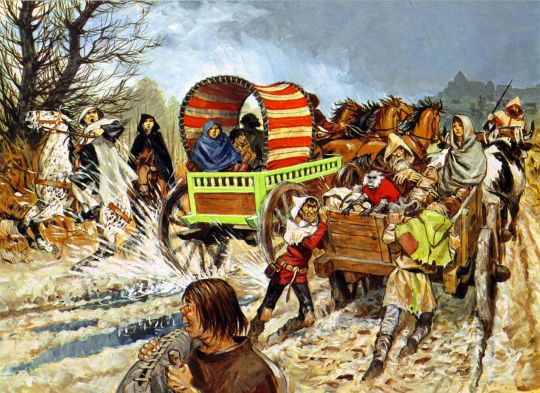
My French Genetics writing got me thinking more about Brittany, and how many academics still believe that the Bretons came from SE Wales fleeing from the Anglo-Saxon invasion. This is due to erroneous medieval assumptions and not historical fact. Our sources on the centuries between the retreat of Rome and the High Middle Ages are very scant, often relying on earlier, possibly faulty accounts instead of direct folk memory, so misconceptions can propagate easily. There is much that we simply can't know. Nonetheless, we have enough to dispel myths and piece together a true story.

The area in question is Armorica, now called Brittany, which is now politically controlled by France. Since the advent of the Celts in Europe, this peninsula has been populated by Armorican Gauls. In the time of Caesar these tribes included the Osimii, the Venetii, and the Curiosolites. We can assume that after the Roman conquest, they lived as typical, if rural, Roman subjects. We can assume they sent their druids to meet in Gaul and Britain with other druids of the area. A Byzantine writer Procopius tells us in the 6th century, that the people of Armorica had the task of ferrying the souls of the dead to Britain. The story goes:
The people of Armorica heard a knock on the door at night, and a low voice calling them. They went to the coast and found boats there weighed down with the souls of the dead, so that the gunwales barely stayed above the water. Leaving from Baie de Depassés at the tip of Armorica, the men would row the boats across the channel to Britain, at which point a voice would call each soul by name, and each soul would disappear when called.
Thus went the druid religion of the Gaulish Armoricans.
But the Empire didn't last forever, and Armorica, being on the far west of the continent, was either thrown around by the political machinations of the Gaulish courts, or so isolated that they weren't even concerned. By 409 the Armoricans, as Zosimus tell us in his "New History",
Encouraged by the example of the insular Britons, had thrown off the Roman yoke. This British-Gallic secession occurred in the time of the Emperor Constantine.
The next year, 410 AD, is when the official retreat of Rome came, and Emperor Honorius told the cities of Britain to "look after themselves." Rome was too weak to hold onto either Britain or, it would seem, Armorica.
We've established the lack of Roman control of Armorica, now we must discover where the new people, the Britons or Bretons, came from.
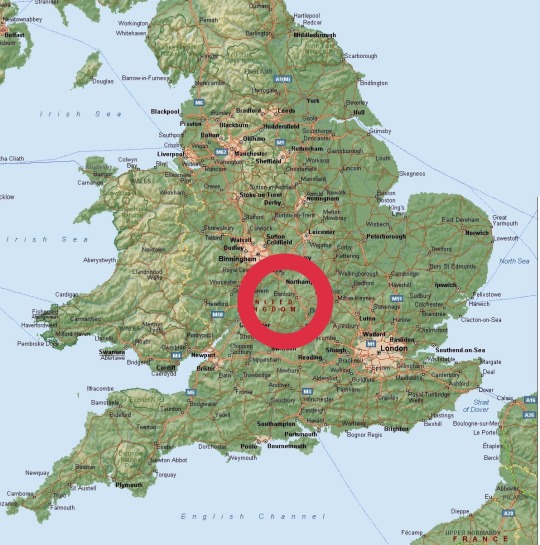

The common narrative is that the Bretons came from central Britain, fleeing from the encroaching Anglo-Saxons; they are essentially Welsh. This idea comes from Gildas (as well as some others, such as Nennius and Eginhard), who said that, 1) the Bretons fled their island from the Anglo-Saxon invaders, and 2) the leaders and generals of the Bretons came from SE Wales. Both of these are misleading. Gildas' account has the Bretons coming from around the above area, and fleeing over the sea through Wales. However, linguists have shown that the Breton language is closest to Cornish, and that many sentence structures common in Breton and Cornish only appear in poetical Welsh. We can see, therefore, that the Bretons could not have come from Central Britain or Southeast Wales, because their language would be closest to Welsh. They instead must have come from Devon starting around 410 AD. What do we make of Gildas' accounts then?
Gildas only states that the aristocrats and military leaders of the Bretons came from Wales, presumably because they had such experience fighting Saxons, that they would be useful against Saxons in Gaul. At the retreat of the Roman Empire from Britain, the island was set upon on all sides by barbarian raids, from the Scots (Irish), Picts, and Saxons. Each was ferocious as the other, enough to be called a "barbarian conspiracy" by Ammianus Marcellinus. I've gone through the extent of the Irish raids before, and how they settled much of West Britain, and especially in the case of the Bretons, the south coast of the Severn Sea. It is impossible for the Anglo-Saxons to force out the Bretons beginning in the early 400s AD, because by 500 AD their expansion was halted at the Seige of Mons Badonius. And in 429, St Germanus wrote that Britain was under the control of Britons. We've already seen Procopius's story of the Bretons sailing to Britain from Armorica, and there is ample evidence of cross-sea interchange of people and ideas between Armorica and the Dumnonian Peninsula.
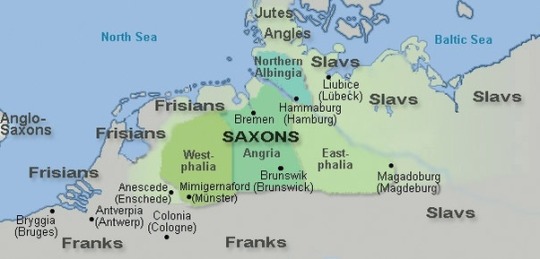
So let's discover the proper story.
In the early 400s, Saxon raiders left their lands in Germania and sailed to the east and south coasts of Britain, as well as to the North of France, as raiders. Because of this new pressure from the east, Roman infrastructure had reorganized itself to accommodate the threat, with all major power centers shifting eastwards. This happened internally in Armorica as well, with all military strongholds now facing the eastern border as well as the coast. A Roman military document, the Notitia Dignitatum, shows that the military command of Northern Gaul was totally removed from the interior and placed around the east and the coast to prevent Saxon landings at all costs. Few measures were taken to protect the west, which allowed the small-scale migration of Celtic Bretons to slip through.

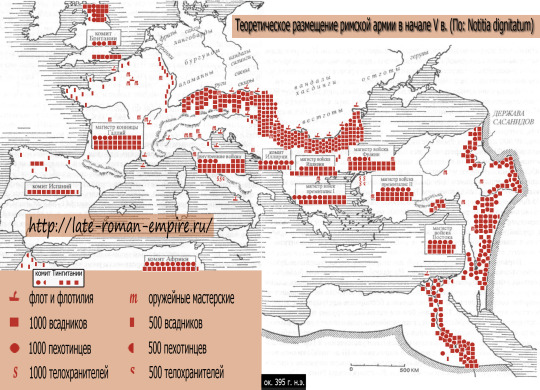
Roman cities such as Nantes, Vannes, and Rennes retained their Gallic language, Roman customs, and Roman affiliation, while the western lands of Armorica slowly filled with this new population which was closely tied to the British Celts. The name Armorica ("by the sea") fades out of use, and the first reference we have to "Brittany" is in a letter written by Sidonius Apollinaris. The people may have called themselves "Lidwiccias", and their land "Lledau" or "Letavia". A Breton tradition tells us that there was, for a time, a double kingdom existing on both sides of the English Channel, ruled by a single King Riwal of Gwent. He came from Eastern Wales and "ruled as 'dux Brittonum' on both sides of the sea until his death."
We have a number of saints' Lives (a biography of the saint) dating from the 9th century, while our earliest Welsh Lives come from the 11th. This, and the constant communication with Britain, indicates a generally high intellectual life in Brittany at the time. So it seems that the Dumnonii people of southwest Britain were not settling Brittany out of flight from invaders, but it was a political expansion encouraged by Irish raids into the Severn Sea. The Bretons expanded willingly into this newly unoccupied stretch of Armorica. As for the formation of a real Breton kingdom, our earliest sources refer to this peninsula called "Prettonaland" as a duchy or a realm, not a kingdom. Frankish sources especially emphasize the dependence of Prettonaland on the Frankish King Childebert.

And while the Franks were expanding their power over post-Roman Gaul under Clovis, the Armorican cities of Nantes, Rennes, etc. recognized the Franks as the rightful rulers of Armorica. The Bretons disagreed. The Franks saw themselves as heirs of Rome, and denied Breton freedom.

The Bretons nominally accepted the title of "Count" in the Frankish court, but this never hindered Breton independence struggles. As the Breton pushed eastward, the city of Vannes was transformed into the city of Bro Waroch ("Territory of Waroch"). Waroch was a lively figure in the accounts of Gregory of Tours, and a major rival of the Franks. In 587 he invaded Nantes, and in 588 he invaded Rennes and Nantes again. In 590 a powerful Frankish army tried to take Vannes, but it was destroyed by Waroch's son Canao. The struggle between Bro Waroch and Frankia lasted for centuries, with the Frankish armies being repeatedly wiped out by the Bretons, but the Bretons unable to hold onto what they had gained. Later, Louis the Pious appointed a native Breton named Nominoë as Count of Brittany, and the same Count then convinced King Charles the Bald to give Brittany independence. The Charles was occupied elsewhere with Viking invasions. With a later successor of Nominoë, named Salomon, Brittany paid tribute and homage to Charles the Bald once again, but within a few years, they had rebelled once more. However, after this failed rebellion, Brittany would enter the feudal world of medieval France. Not peacefully, not willingly, but the destiny of Brittany was forever tied to France. Here is what Arthur III of Brittany said about it in 1458:
I have always served Charles and his kingdom; I am constable, and as such I am bound to comply with the King's orders, but not as Duke of Brittany. I am not a peer of France, since my duchy has never been a part of the kingdom, and it is not a dismemberment of it; and, in order not to compromise the independence of my subjects, I will not appear in Montargis or elsewhere.
Fin

#brittany#celtic#history#france#french history#Britain#british history#bretons#rome#franks#gaul#druid#medieval#dark age#celt#europe#european history#french#emperor#kingdom#duchy#early medieval#Atlantic
20 notes
·
View notes
Text

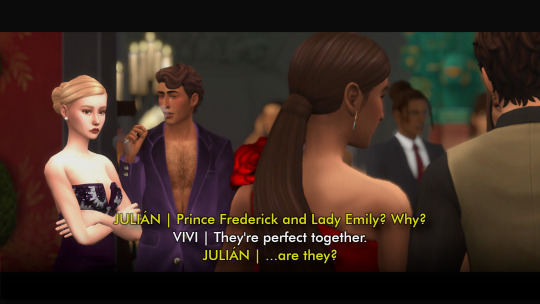



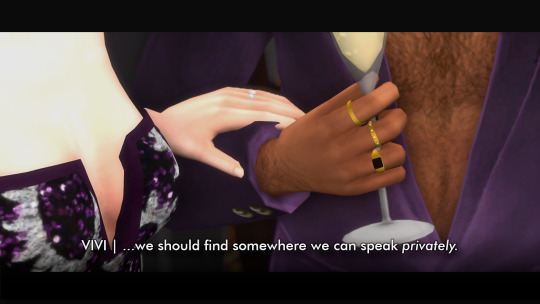
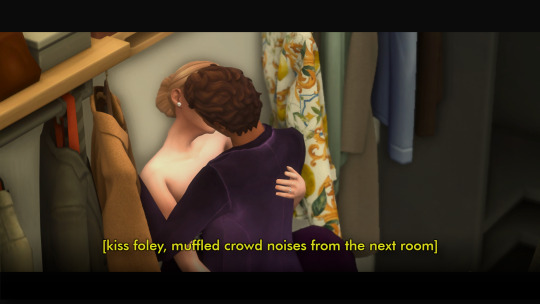
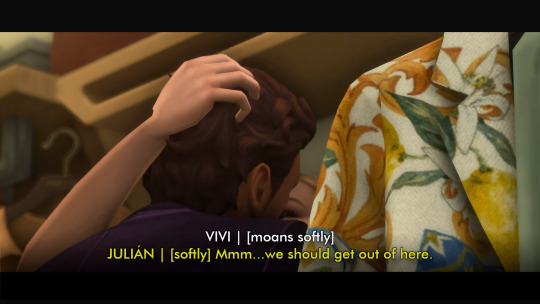

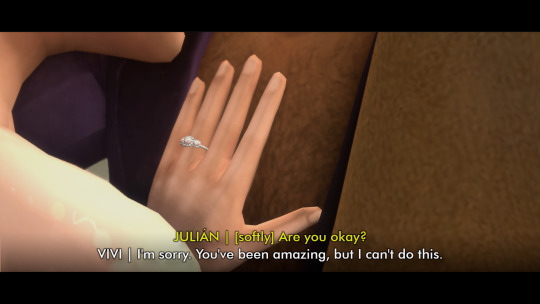


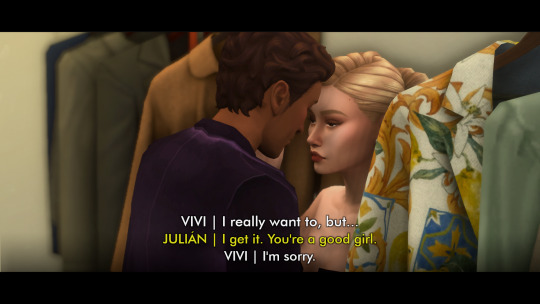

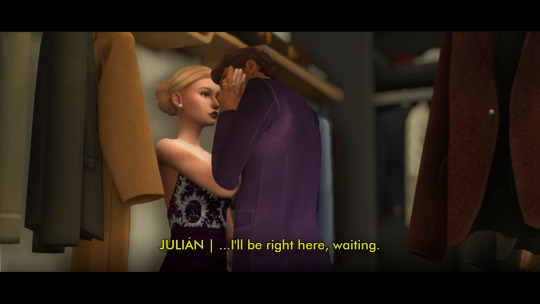
Previous | Chapter Start | Beginning | Next
Transcript under the cut.
Crown Museum of Uspanian Art and Culture // Armorican State Visit - Day 3
VIVI | ...I kind of hate them. Does that make me terrible?
JULIÁN | Prince Frederick and Lady Emily? Why?
VIVI | They're so perfect together.
JULIÁN | ...are they?
VIVI | Well, I think so. Opposites attract, right?
JULIÁN | I think there's something to be said for shared interests.
VIVI | Like what? Music and fashion?
JULIÁN | Music, fashion, long walks on the beach...you look lovely, by the way.
VIVI | Stop. You're ridiculous.
JULIÁN | Beautiful, I'll say it as many times as it takes for you to believe it.
VIVI | Shh! What if someone overhears you?
VIVI | ...we should find somewhere we can speak privately.
[Makin' out in the coat check room]
VIVI | [moans softly]
JULIÁN | [softly] Mmm...we should get out of here.
JULIÁN | [breathily] I want you in my bed. I want to get my mouth on you. I want—
VIVI | [gasps] W-wait—
JULIÁN | Are you okay?
VIVI | I'm sorry. You've been amazing, but I can't do this.
VIVI | My husband—
JULIÁN | He's not here, beautiful. He can't hurt you.
VIVI | I know.
VIVI | I'm sorry. You've been amazing, but...I just can't.
VIVI | I really want to, but...
JULIÁN | I get it. You're a good girl.
VIVI | I'm sorry.
JULIÁN | You apologize too much. You've done nothing wrong. But if you ever change your mind...
JULIÁN | ...I'll be right here, waiting.
#armorica story#chapter 3#behind the scenes#armorica collabs#nexility sims#character: julian reyes#character: vivienne meijer#character: frederick st. fleur#character: emily chandra
67 notes
·
View notes
Link
Chapters: 1/1
Fandom: 英雄伝説 VII | The Legend of Heroes VII (Video Games)
Rating: General Audiences
Warnings: No Archive Warnings Apply
Characters: KeA (Kiseki Series), Lloyd Bannings, Elie MacDowell, Tio Plato, Randy Orlando
Summary: There are normal days and some days the possibilities spread and twist
Trick or Treat exchange treat for @azurefishnets!
There are days when everything is, what KeA would guess, normal. She is present and the clock ticks in an endless circle, predictable and linear, and there is so much life and vitality around her. She is here and her family is here and her friends are there and life is wonderful.
Life is wonderful and she can almost forget the fragility of it all.
And some days the possibilities spread before her like a patchwork quilt, patches upon patches and threads fraying and twisting.
And she sits with Lloyd while he tells her a story and
It’s the rules of a game
And she call his name to an empty void.
And the room is empty and full of dust.
And the Special Support Section never existed.
And Lloyd speaks her name and she looks at him and she sees
Death.
And a young man fighting through every barrier.
And an older man bitter and broken by systems he couldn’t change.
And Lloyd surrounded by family.
And Lloyd’s hand over hers in a dark place.
His hand lands in her hair, a pat, a soft ruffle and a concerned look and Lloyd is here and she is here and there is one thread she knows she will cut short. The paths fade and for now she knows only a simple story.
She walks beside Elie on a sunny day and the bustle of the crowd is a joy to listen to. So many lives and so many stories unfolding around them. The orbal car speeds toward them and
Elie knocks her aside.
And the car veers into the crowd.
And the car took a different street.
And the driver is stuck at home.
And the car never existed.
And Elie gently tugs her hand and pulls her to the side.
And Elie is dead.
And Elie never returned to Crossbell.
And Elie gives command from the tallest tower.
And Elie stands against an old friend.
And KeA nods as Elie gently chides her to pay more attention to the streets. The car continues its journey. The day goes on. Nothing happens this time.
The tree towers above, branches spreading out to shade the area chosen for their picnic. The smell of flowers and honey tint the air.
She’s spread out and Crossbell lies below.
Sorrow fills every hollow.
She said no.
And she said yes.
And she’s alone.
There is nothing.
And everything.
And Tio touches her arm and she is an empty shell.
And Tio is dead.
And Tio walks strange labs.
And Tio remains in the hospital.
And Tio is free.
And for the briefest spell they share a look that goes unremarked—an emptiness they both know filled. Then Tio offers her a Mishy bun and it’s a pleasant day in the fields of Armorica.
It’s Randy’s turn in the kitchen and he’s happy to let her help. She gathers ingredients while he chops beef into smaller cubes and
It’s fish.
And she’s alone in the kitchen waiting for them to come back.
And they don’t come back.
And she’s in a dark place alone.
And Randy catches the carrot she drops.
And Randy’s blood drips to the floor as his death comes.
And Randy is surrounded by the dead in a battlefield.
And Randy is a soldier.
And Randy is crumpled at a family member’s feet.
And Randy is here with true family.
Eyes lock onto hers and she sees the concern he’s allowed to come out from the shields she knows he wears. And he flips the dropped carrot onto the cutting board with a wink and they make a normal dinner on a normal day for their family here and now and always.
And Lloyd’s hand takes hers and she is guided from the dark. The possibilities fall away and collapse to a singularity. She sees only one path before her and she follows Lloyd into the light.
#the legend of heroes#zero no kiseki#ao no kiseki#kea bannings#lloyd bannings#elie macdowell#tio plato#randy orlando#trails fic#trick or treat exchange
6 notes
·
View notes
Note
I have a few questions about the world and other stuff. I’m becoming obsessed with Inver now.
1. What type of entity is the Red King? Do they have a set form or can they change it? What is their personality like? Do they have a human-esque form that you’ve ever drawn before?
2. Are werewolves/lycans considered a type of fae? Or do they simply just worship the fae you call The Immortal Hound? I know they came from Armorica, but I’m curious about their origins. Are they magical or evolutionary?
(If answering any of these spoil any of the books, feel free not to answer)
hiiii thank you for asking!!
1 - The Red King is a barrow lord. There's not strict hierarchy (or strict rules at all) about faeries, but a barrow lord is a faery famous enough to be known by their name & to have attracted many followers and superstitious legends. Barrow lords are usually referred to euphemistically and not by their name (i.e why we don't say 'Puck', we say The Lord of Lies) to avoid attracting their attention. The Ruad itself was named after the Red King who traditionally holds dominion over that entire forest. Sometimes it's called the Red Forest, but that refers strictly to the king and not the actual colour of the forest. The Red King is considered to be in direct opposition to the Immortal Hound, they're ancient enemies.
Until recently, the Red King was considered to be the highest & final authority in all of Inver. Although stories and legends always crop up around the forest, there have been no confirmed firsthand accounts of the Red King in almost a century.
Followers of the Red King were once numerous, but in the 1860s the practise has waned as the Immortal Hound's followers gain more and more power. Small sects remain, particularly in communities close to the edge of the Ruad. The Sons of the Stag/"Stagsons" criminal gang in Invergorken city are adherents of the Red King, and operate under the assumption that the King of Inver's laws are false, because he's not the true king (this is not a valid defense in court).

The Red King is emblematic of Prey. In most stories he takes the form of a red deer with the rotting head of a stag rival entangled in his antlers (that's his crown). Followers of the stag are bound to his core principles of cold, hard survival and fighting for their lives; prey animals get no respite if they show any signs of weakness, and are often more violent and dangerous than any predator, because in every fight, their life hangs in the balance, and not just their hunger, and the Red King is the prey victorious.
Famously holding humanity in utter contempt, the Red King does not take a humanoid form, though some legends of green men are occasionally ascribed to the Red King.
2 - The werewolves are considered to be humans which have been given the ability to become beasts; not faeries of their own accord but definitely in commune with the Immortal Hound (who is a barrow lord). They don't all worship the Immortal Hound (as you'll probably see..) because lycanthropy is hereditary. If your parents were lycanthropes you probably will be as well, but you share a werewolf form with them - whatever werewolf your dad turned into, your werewolf form will look identical, because it is dictated in part by your own physical qualities and in part by a manifestation of your family's pact with the Immortal Hound. Size, physical power, triggering moon phase - these are determined by the terms of the pact your ancestor made (often under the purview of the monarchy, so naturally the higher ranking nobles have the best werewolf traits
So like anybody can make a pact with a faery (if the faery gives enough of a shit to accept), usually the human gets some knowledge in return, mostly about spellcrafting (this is what the title 'witch' refers to in Inver). Technically this means that the werewolves are just witches with very specialised pacts, but not a lot of people think of them that way (Félix is not in this category, he's something else).
Usually 'werewolf' is an umbrella term for anybody in pact with the Immortal Hound, but 'lycanthrope' refers solely to the family line 'body transforming into a big canine beastie' type of werewolf. A 'fleshwolf' is the other type, they do not physically transform but wear the flesh of the Immortal Hound like power armour. The pacts of some lycanthropes stipulate that they can bite someone to turn them into a fleshwolf (fun fact)
#setting: inver#u wanna know what's crazy.. in book 2 we meet a third king who is also red-themed#bearing in mind that king régis (the head of the monarchy) is also red themed#this wasn't intentional btw
82 notes
·
View notes
Text
At Hel’s Edge: A Viking Loki Story - Chapter One - The Curse

Art by @caffiend-queen
---I am posting the entirety of this fic on Tumblr for the first time, in anticipation of taking it down from AO3, since it is being turned into a Webtoon by the incredibly talented artist @papergangster! I will post a chapter every few days. If you want to read ahead the whole story can be found here for the time being: https://archiveofourown.org/works/14940284/chapters/34615787
There were many stories about Bredg’s mother Verða, that famed and curse’d she whose very name meant ‘a thing that must be dealt with.’
The ones her son knew to be true were few enough. That she had been a slave - brought home by the king after visiting the settlement in Armorica - with filthy black hair and snarling teeth was known by all. It was said she was wild, and ugly, with big features and a cruel, oft cursing, mouth, but that she had a clever, ravenous cunt that the king - having taken her to bed when the queen was too great with child to be meddled with - was unable to free himself from once he had been drawn within her power.
The king had her bathed and her hair deloused. He had her draped her in linen and gold and let her laugh at the golden and red haired maidens who wanted to be his second wife.
The other slaves went in fear of her, knowing she would relieve her spite upon them - biting and punching for the mostly imagined slights she endured, her long, thin arms holding surprising strength. Once, when an assassin had breached the hall while everyone slept she had woken and, after watching him slit the throats of the lazy guards who had fallen asleep, she took the king’s spear from the wall and threw it with the might of a giantess, impaling him to the wall, and then painted runes around his dying body with his blood, cursing those who sent him.
The king gave her arm rings that he might have given one of his jarls, because he said she was fiercer than any of them. She would take the mead cups from hands of his feasting warriors, getting drunk on their wine and like them would pull pretty girls onto her lap and kiss them until they swooned and fought for her favor.
She refused to tell anyone, even the king, where she had come from before she had been captured. Or what her true name was.
One time she said she was from the dark forests past the lands of the Rus. Another from Hibernia, from the lands of the Tuatha de Danann under the hills where time stopped and started at the will of their gods. Still another story had her from the Maghrib, where she had been born to a surviving Vandal, one those whose empire had been overrun by Byzantium, and one of those Berbers who had killed the Byzantines in their turn.
It was said she was actually a troll wife, using dark magic to look mortal and deceive their king to some unknowable end.
It was known that only the queen was exempt from her malice, having been a legendary shield-maid in her youth and a powerful fjǫlkunnig afterwards. The queen had even made herself a cloak of white bear fur and eaten the raw heart of an elk killed by her magic, and was welcome in the hut of the oldest vǫlva, who was gifted in prophecy.
Verða respected the queen alone, and so when she was dying after having birthed Bredg, she called for her.
“Would you have me save you?” the queen asked, giving her a sip of watered ale for strength.
“No, dróttning . Death frees me. From your man’s pawing hands, from the stink of the mead hall and the fucking cold. Take my child. Raise him with your Soren. Let them be brothers and then I can go into the many-colored lands with no fear. You are a better mother than I would have been to him.”
She turned her head and looked at Bredg, his eyes the color of her true home, his hair a black mass of curls, and kissed him with the only tenderness anyone had seen from her. At the same moment a great log within the firepit cracked, and she laughed. “My gods are far from here, so let your fire god, the strange one, Loki, be my child’s patron.”
“You should not wish it so. Loki would torment even those he loves.”
“Just like all men,” she answered, dying.
The queen gathered the babe up, wrapped in the blanket that had covered his mother, and carried him to her chambers.
Years passed. The slave’s son was raised beside the queen’s, to love each other, to fight each other, the golden bear cub and the black wolf pup, brothers in all ways.
They came to their majority in time, the king ready to step aside for his and the queen’s son, knowing that his other child, more clever and subtle, would ever speak wisdom to his brother, who was often in need of cooler council.
All admired and sometimes feared the king’s sons, Soren the Golden with his strong arm and ready laugh, and his brother Bredg the Black, with his sly gaze and keen-edged tongue, were as inseparable as day and night, one ever following the other.
Soren, mountain shouldered and ocean-eyed, was beloved of the warriors and shield-maids, armed with an axe and boar spear he could knock forth a turtled warband by his strength alone, though he was much skilled in arms and could, when his patience could be found, be a leader without equal.
Bredg, kestrel swift and leaf-eyed, was beloved of the wise folk and those who were wise enough to desire peace. But when battle came few were braver, as he moved like the wind itself, speeding past enemies who were cut and dying before they knew that they had been touched by his gutting knife.
The night before Soren was to take his father’s seat at the head of the meadhall, they drank with their comrades and boasts were made. Of feats on the battlefield, and at feast, and in the bedchamber. Only Bredg kept his own council, drinking moderately and speaking little, neither of which was his wont.
He had since rising had a feeling of ill-omen and so remained sober that he might watch over his brother.
Soren drank deeply and boasted long into the night.
Of how his arm was touched by Thor and struck as hard as the god’s lightning.
Of how his brow had been kissed by Freya, and so he was gifted with her beauty and her battle-wisdom.
Of how his will was fashioned by Odin, and so was strong enough to rule even the fierce and independent North men.
And on and on, thanking all of the gods for their gifts to him.
Save one.
As any child who has heard a story at an old lady’s knee knows, you must never forget just one. And if you do forget just one, it should never be Loki.
When Bredg warned his brother, as they walked through the velvet darkness, that he had forgotten the God of Mischief, the Lie-smith, whose favor all men will need some day, Soren clapped him on the back.
“Thank him for me, brother. He is your patron, after all.”
Sighing, the king’s black haired son knew that he must try and protect his brother, even if he was a fool.
So that night Bredg stood in the kitchens, where the hearth is Loki’s altar and where the wise house-woman thanks Him for unburned bread and properly cooked meat, and poured mead and claimed his brother’s gift for winning maidens to his bed came from Loki, whispering clever seductions into his ear, but the Jotunn god, Odin’s blood brother, would not be appeased by these words.
The next morning, Soren woke, raving and tearing at his flesh, an invisible fire tormenting him. He would calm for a time, long enough to drink water and eat a few bites of food before falling back into madness. Only his mother’s hand on his forehead and the force of her seidr would allow him rest.
The queen sat on the edge of his bed and sang to him as she had when he was a babe until he calmed and slept. Then she called for her other child and walked with him outside of the hall, but not straying far, should she be needed.
“Bredg, you must go to the vǫlva and ask her to beseech Loki and find what will offer Him comfort in His wrath, to spare your brother, or I think he will die a madman.”
“Mother, will she speak with me?”
“For my sake she will. Do whatever she asks.”
The vǫlva lived in a hut near the forest, far from the hall and the farms of the other folk, for they feared her and they bored her. The floor was clean, her few furnishing well-kept, a pot of soup boiled on the fire, and her garden was neatly weeded and flourished in the early summer light. All as would be expected from any aged widow of good standing.
But from the ceiling hung the cleaned and rune-carved bones of a hundred animals, from the vole to the boar to man. When Bredg entered the breeze that followed him rustled them, so they made sounds of like flutes and chimes.
“I know why you are here, son of two mothers. To save your brother. Why would you wish to, when if he is mad you might be King?” The woman’s gown was covered in the beaded necklaces of a thousand tributes from the warriors who had come to her for luck and blessings before going Viking and had returned with gifts of gratitude and fear. Her face was covered in wrinkles, each speaking of her knowing years.
“I do not wish to be King. It is better to control the one who sits at the head of the meadhall than to be that one. I love my brother, but he lacks wisdom and I would rule through him rather than in his place.”
“You are honest for one who is loved by the God of Lies.”
“No. But I am wise enough to know who deserves my truth.”
She laughed, and offered him water. “You are to go raiding soon.”
“My father has called off the raid to Hibernia, since my brother cannot lead the party.”
“No. You will go and lead. There is monastery of females near the coast, with fat farms and lazy farmers around it. When you take it there will be a girl there with fiery hair, which marks her as Loki’s own. You will take her to the rock where He was bound and shed her blood there, that He might be comforted in His wrath at your brother. Her blood will soothe the venom of the viper that drips onto His face when His wife must empty Her bowl.”
Such a sacrifice, such a request, was harsh even for one such as Loki.
Bredg frowned, “There are red-haired girls aplenty here. I could shed the blood of a hundred in the time it would take me to go to Hibernia and drag her all the way to His rock. Surely the blood of one maiden is as red and as sweet as that of any other.”
“But He wants the Hibernian girl,” she said, as if speaking to a dim child.
Nóirin was weeding Sister Agnes’s secondary herb garden, hidden in the trees when the Northmen came.
She had been cursing the holy sister for an hour as she worked in the dark, her fingers stinging as she brushed thistles and then burning as the oils from some of the healing plants found their way into her wounds. But the nun had insisted that the weeding must be done under the light of the full moon due to the delicate and efficacious nature of the herbs.
Which was bollocks as far as Nóirin was concerned. Some business from one of the massive Latin books the Sisters kept. She liked to read them herself, Sister Constantia having taught her the language of the old Romans just like she was one of the proper Novices and not just a servant taken in for charity’s sake, but most of them were filled with learned nonsense when it came to farming. Stuff written by men who had never turned their hand in the dirt.
Still, she couldn’t complain. Sister Agnes had decided that Nóirin would be her assistant since none of the current group of Novices had any aptitude with medicine, so her work was less strenuous than many of the other servants. No working the fields or washing the endless reams of linen the holy woman dirtied, she never mucked the pigs and only had to scrub the floors in the infirmary and the herbarium. And listen to the Prioress’s urging her to take orders.
“Although your mother left you here and we have taken you in as a charitable service, you are a bright girl, Nóirin. Not like the other servants, you could actually accomplish something with your life if you were to take orders. I could even see you starting your own monastery, if you could get your head out of the clouds for more than an hour at a time,” the elegant woman said, offering a complement as an insult and an insult as a complement.
“Rather not,” she had answered, offering no more explanation to turning down a flattering offer. She also appreciated that the Prioress had not mentioned the honor of offering her life to the glory of Christ in her offer. It was one thing to turn down earthly glory, but even though Nóirin’s people followed the old ways it didn’t do to insult any of the gods. Especially the one who insisted He was alone up there.
The Prioress had been right about her thoughts being in the clouds. Or, rather, they were simply far from the cloister. Nóirin once dreamt of life in a village, as a wife and mother.
She dreamt of it once .
And then laughed herself silly.
What she wanted, truly wanted, was simply to go! To be free of the Sisters, of the other servants who resented her favorite status and then also were proud that one of them was considered special, of the Novices who hated her for being little more than a slave and yet speaking Latin with hardly an accent and yet wanted her to be their friend because they were all lonely little girls. Free of the coast and sound of the sea that taunted her with its stories of seeing the world.
To wander in the mountains.
To see cities, proper cities, like Rome or Constantinople.
To take a boat upon a great river and watch the world she passed.
She cut her finger on her spade.
“Fucking garden!” She stood, sucking the wound, and when she was upright the alarm bell in the tower tolled.
Raiders.
Leaving the basket of herbs, tucking her knife back into her boot, she ran back to the cloister, fleet and sure as a long eared hare, her earth-brown braid a flag behind her.
Bredg’s men were wild and eager. He had chosen his raiding party for their wits as much as for their strong arms, but no man who went a-Viking was cool-headed. Save Bredg himself.
“Remember,” he shouted above the roil of the sea as they approached the shore, “take what you will - gold, food, slaves, but -”
“Any red-haired girls are to be brought to you!” Half of the men called.
“Untouched!” The rest finished and all laughed.
“Don’t worry, Jarl Bredg, no one will take the auðr you’ve claimed, especially as you have said you will take no other plunder. Hel’s tits, we’ll find you more red maids than even your cock will know what to do with!” said Thorvald, Soren’s closest sword-brother, who alone knew why their leader sought such a girl but played ignorance.
The boats glided upon the land with no more sound than a goose’s wing on the air, and they were on the farthest outlying farms before a signal could be raised.
There were no red haired girls there. Ravens aplenty, brown haired farm maids, even a golden young wife, but none kissed with fire.
But Bredg knew she wouldn’t be found amongst the sheep, she would be in the shelter of their god’s women.
When the fires were seen the bells sounded and he knew they had to reach the convent before they could shut their gates. The foolish women would leave them open for the peasants to run to for as long as they could and now it was a race through the fields and the thin forest to reach it first.
His men and the few shield maids who raided with them moved through the forest wolf-like and fast, prey scented and hungered for. Bredg saw them trample a garden of healing herbs. Someone had been there that night, a basket of fresh cut plants perfumed the air.
The screams of the slower Hibernians sounded as the surest footed of his men reached the clearing where the monastery stood. They would be in.
All was on fire when Bredg arrived, the air filled with soot and the smell of blood and fear and rage.
He had eyes only for the girl. She had to be here.
“There are no girls here!” Thovald’s hoarse voice found him as he searched the chapel, filled with aging nuns who prayed to their Roman god and pretended that the Northmen were not there, under the stern eye of their Prioress.
“What?” Bredg was tired and filled with fear for his brother. The farmers in the courtyard had put up a fight, more than was expected.
“No girls, only these holy hags. They must have had another way out and sent the maidens through it to spare them.”
“Find it!”
The cave was but ten yards from the tunnel that they had followed out of the cloister, but Nóirin could lead the novaites no farther. The Northmen were everywhere, searching for them.
For rape.
For slaves.
She had done her part, as had been instilled into her over and over by Sister Agnes should this happen, that she was to take the girls - Novices, servants, the younger nuns - and lead them to safety, no matter what else should happen. Because she was the cleverest, and the bravest.
Nóirin felt neither now, though she had been proud as anything when she had been given the important task. Should the Northmen come.
Now they were trapped, in a cave that felt smaller by the moment, that would sure be found by the Northern devils so loudly were some of the girls breathing. The leader of the Vikings, the looking like very devil himself, black-haired and tall as an ancient tree, looking more to be a Gael than one of the raiders, was driving them in their heathen tongue.
It was like he could smell they were near.
The girls huddled close to her, trying to not sob, afraid in the dark, all holding torches they could not light, all wanting her to do something that would save them. The littlest, Grania who was the cook’s child, clutched her hand and buried her face in Nóirin’s skirt.
They were so close to the path that would lead them to safety, if the Northmen would only look away.
They needed a distraction.
Nóirin fiddled with a piece of flint like it was a holy bead and prayed for an idea. Even a mad one. Which was the kind that came to her. With a hasty beseeching of Brigid, saint of the springtime or the goddess of fire, she wasn’t sure which she whispered to Dione, the oldest and steadiest of the novices.
“You have to take them up the path. Keep them quiet and safe,” she whispered as she started to unhook her apron.
“And where will you be then?” the girl answered, furious, anxious, and wisely quiet.
“Out there, making a spectacle of myself,” she answered, and then added, “see if there is any pitch on one of those dark torches, then.”
“What for?”
It takes a great deal to distract men hunting for girls.
But one girl can do it.
If she is mad.
And brave.
And shouting like a bean sí.
And naked,
And her hair is on fire.
The girl ran from what looked to be nowhere straight through the mass of Bredg’s raiders, screaming loud enough to wake the dead in Ran’s hall, her long legs carrying her past the stunned men, who jumped back from the fiery rope of hair that followed her.
Bredg gave a harsh laugh and tackled her, hard enough to drive the wind from her as they rolled in the dirt, and she struggled like a wildcat but had the strength of a kitten in her scrawny body, and no idea how to fight. Straddling her, the burning braid of her long, long hair wrapped about his fist, he leaned in and said in her ear, low and sneering, in priestly Latin, “If you come quiet then I won’t tell my men where you’ve got the other’s hiding.”
She glared at him, her eyes lit with by fire from her hair, her lips set in a growl. He could see the defiance in her eye die.
She nodded.
One swing of his seax severed her braid, which he threw into the trees so he could no longer see her, and cursed his God for a bastard.
31 notes
·
View notes
Text
Day 12 of 30 Days of Manawydan
Places associated with this deity and their worship
Dyfed - His stepson Pryderi is Prince of Dyfed as was his father Pwll
Arberth - The town plays a high-profile role in Welsh mythology, where it is the chief palace of Pwyll, Prince of Dyfed, and a key setting in both the first and third branches of the Mabinogi.
Gwales - the island where Manawydan and the other surviving knights rested with Bran the Blessed’s talking head. Grassholm has been identified with Gwales, an island in the medieval Welsh story Branwen ferch Llŷr (Branwen the daughter of Llŷr), one of the Four Branches of the Mabinogi. Gwales is the site of a fabulous castle where the severed head of Brân the Blessed is kept miraculously alive for eighty years while his companions feast in blissful forgetfulness, until the opening of a forbidden door that faces Cornwall recalls them to their sorrow and the need to bury the head at the White Mount (the Tower of London). Brân is the Welsh for 'Raven', which have a legendary connection with the Tower of London
London (ludgate) - Where Bran the Blessed’s head was buried "London" is an ancient name, attested already in the first century AD, usually in the Latinised form Londinium;[62] for example, handwritten Roman tablets recovered in the city originating from AD 65/70-80 include the word Londinio ("in London").[63]Over the years, the name has attracted many mythicising explanations. The earliest attested appears in Geoffrey of Monmouth's Historia Regum Britanniae, written around 1136.[62] This had it that the name originated from a supposed King Lud, who had allegedly taken over the city and named it Kaerlud.[64]Modern scientific analyses of the name must account for the origins of the different forms found in early sources Latin (usually Londinium), Old English (usually Lunden), and Welsh (usually Llundein), with reference to the known developments over time of sounds in those different languages. It is agreed that the name came into these languages from Common Brythonic; recent work tends to reconstruct the lost Celtic form of the name as *[Londonjon] or something similar. This was adapted into Latin as Londinium and borrowed into Old English, the ancestor-language of English.[65]The toponymy of the Common Brythonic form is much debated. A prominent explanation was Richard Coates's 1998 argument that the name derived from pre-Celtic Old European *(p)lowonida, meaning "river too wide to ford". Coates suggested that this was a name given to the part of the River Thames which flows through London; from this, the settlement gained the Celtic form of its name, *Lowonidonjon.[66] However, most work has accepted a Celtic origin for the name, and recent studies have favoured an explanation along the lines of a Celtic derivative of a proto-Indo-European root *lendh- ('sink, cause to sink'), combined with the Celtic suffix *-injo- or *-onjo- (used to form place-names). Peter Schrijver has specifically suggested, on these grounds, that the name originally meant 'place that floods (periodically, tidally)'.[67][65]
Ireland - Manawydan went to Ireland to negotiate peace with the king after he beat his wife their sister The long-standing traditional view, once widely accepted,[by whom?] is that the Celtic language, Ogham script and culture were brought to Ireland by waves of invading or migrating Celts from mainland Europe. This theory draws on the Lebor Gabála Érenn, a medieval Christian pseudo-history of Ireland along with the presence of Celtic culture, language and artefacts found in Ireland such as Celtic bronze spears, shields, torcs and other finely crafted Celtic associated possessions. The theory holds that there were four separate Celtic invasions of Ireland. The Priteni were said to be the first, followed by the Belgae from northern Gaul and Britain. Later, Laighin tribes from Armorica (present-day Brittany) were said to have invaded Ireland and Britain more or less simultaneously. Lastly, the Milesians (Gaels) were said to have reached Ireland from either northern Iberia or southern Gaul.[27] It was claimed that a second wave named the Euerni, belonging to the Belgae people of northern Gaul, began arriving about the sixth century BC. They were said to have given their name to the island.[28][29]The theory was advanced in part because of lack of archaeological evidence for large-scale Celtic immigration, though it is accepted that such movements are notoriously difficult to identify. Some proponents of this theory hold that it is likely that there was migration of smaller groups of Celts to Ireland, with sufficiently regular traffic to constitute a "migration stream", but that this was not the fundamental cause of Insular Celticisation.[citation needed] Historical linguists are sceptical that this method alone could account for the absorption of Celtic language, with some saying that an assumed processional view of Celtic linguistic formation is 'an especially hazardous exercise'.[30][31] Genetic lineage investigation into the area of Celtic migration to Ireland has led to findings that showed no significant differences in mitochondrial DNA between Ireland and large areas of continental Europe, in contrast to parts of the Y-chromosome pattern. When taking both into account a study drew the conclusion that modern Celtic speakers in Ireland could be thought of as European "Atlantic Celts" showing a shared ancestry throughout the Atlantic zone from northern Iberia to western Scandinavia rather than substantially central European.[32]
Annwn - the otherworld where his wife Rhiannon comes from and her first husband Pwll pen Annwn (head of Annwn) was partially head off. Annwn, Annwfn, or Annwfyn (in Middle Welsh, /ˈænuːn/ Annwvn, Annwyn, Annwyfn, Annwvyn, or Annwfyn) is the Otherworld in Welsh mythology. Ruled by Arawn (or, in Arthurian literature, by Gwyn ap Nudd), it was essentially a world of delights and eternal youth where disease was absent and food was ever-abundant. It became identified with the Christian afterlife in paradise (or heaven). Middle Welsh sources suggest that the term was recognised as meaning "very deep" in medieval times.[1] The appearance of a form antumnos on an ancient Gaulish curse tablet which means an (other) tumnos (world), however, suggests that the original term may have been *ande-dubnos, a common Gallo-Brittonic word that literally meant "underworld".[2] The pronunciation of Modern Welsh Annwn is [ˈanuːn].Mythical locations[edit]In both Welsh and Irish mythologies, the Otherworld was believed to be located either on an island or underneath the earth. In the First Branch of the Mabinogi, it is implied that Annwn is a land within Dyfed, while the context of the Arthurian poem Preiddeu Annwfn suggests an island location. Two other otherworldly feasts that occur in the Second Branch of the Mabinogi are located in Harlech in northwest Wales and on Ynys Gwales in southwest Pembrokeshire.
#30 days of deity devotion#30 days of devotion#30 days of manawydan#manawydan#Cymraeg polytheism#welsh polytheism#welsh myth#welsh folklore#welsh magic#iolo morganwg is most likely a fake#for love of Llyr#the children of darkness have my soul#Bran the blessed#Branwyn#rhiannon#ceridwen#pryderi arawn
2 notes
·
View notes
Note
Can you tell bit more about your spiritual journey? How did you come to greek gods specifically? Why them and not any more "native gods" (assuming your area / country has any)?
Let me start by the issue of “native gods”. I’m French, I was born in the part of France that was called Armorica under Roman rule. So, the question of native gods in my case is both complicated and simple. The city I lived in was conquered by Julius Caesar in 56 BC, during the Gaulish wars. Within that logic, my “native” gods should have been the historical syncretism between original Gaulish deities and the Roman ones. So what happened to me?
First, I’m a history major. Specialized in Roman history. I enjoyed Greek history classes a lot, but it’s not what brought me to the Greek gods. Second, I was a historical reenactor for about 5 years, but for the medieval period (XIV-XVth centuries). The spiritual journey didn’t start off a spiritual. It started off as me looking up for reenactement stuff but for the Roman era. This led me off to Roman Polytheism. I would probably have stayed on this if the Roman way wasn't so political in nature. Why not Gaulish? I'm not drawn to them. My spiritual link to Rome runs deep, very deep. It's the reason why I don't consider myself a Hellenic recon. I can't, my practice is much closer to the one of someone who would have lived in the Roman province of Greece, if I had to compare it to an historical entity. Or a Roman hellenophile (and there were many, not pointing at you, Nero). So that's for the background story. As for how and why Dionysus in particular and the others, I went through the details on that particular page Here and it also tell you how my rational ass ended up accepting that spiritual
I guess the best answer I can give is that the greco-roman pantheon is the one I actually worship. Not the Hellenic one per se. My use of the #hellenic pagan tag is definitely more a matter of practicality. That being said, I have enough historical background to separate my personal practice to the recon 5th century BC Hellenic paganism.
I hope this somehow answers your original question. I might have digressed at some point.
TL;DR: The Greco-Roman pantheon was worshiped on my native land along with the Gaulish gods. Technically they can be considered my native deities. The rest stems from my academical interest in Ancient history. I don’t consider myself a Hellenic recon because of my Roman leanings.
25 notes
·
View notes